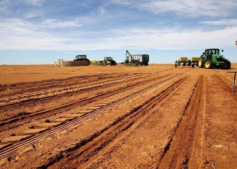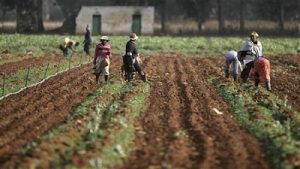Changing weather patterns have been linked to food security challenges in many parts of the world. According to the 2022 mid-year global report on food crises, an estimated 140 million Africans face acute food insecurity.
Small-scale farmers at Ga-Matsepe village, outside Groblersdal in Limpopo, say recent erratic weather patterns have negatively affected their crops and diminished their profits.
There’s still no rain in sight, more than 20 days into September in Ga-Matsepe village. A small breeze tempers the scorching sun.
Both man and the earth are parched by the heat. At the Dipokolo farming project, the land looks fertile.
The small-scale farmers have planted sweet potatoes, tomatoes, and mealies, which are sprouting in the soil. One of the farmers, Michael Mamadisa, says farming was good at the beginning of their farming project in 2012.
“When we started farming here, we used to have big yields of potatoes. We were yielding enough to fill up that big truck twice and sell at the SASSA pay point. The mealies also gave us enough yields.”
No consistent water supply
“This year our sweet potatoes gave us nothing; we could not even fill up a single truck with the mealies; we got nothing at all with the type of rain we have seen; we do not even know how we can decrease it; we do not even know if we can ask God to give us less rain; we do not know what to do.”
Farmers in the area are worried about a lack of water. They say that there is no consistent water supply, which means that they have to also dig into their pockets to buy water.
“We are losing a lot because when the crops do well with the rain, we can take some of the crops home to feed our families, but if the rain is doing this, we are powerless, and when there is no rain, we have to take our own pensions to go buy water from those with boreholes.”
Both farmers and the land look towards the sky, hoping for much-needed rains.
Food Security | Political economy of South Africa’s agricultural sector: Wandile Sihlobo
-Report by Baatseba Mabowa






